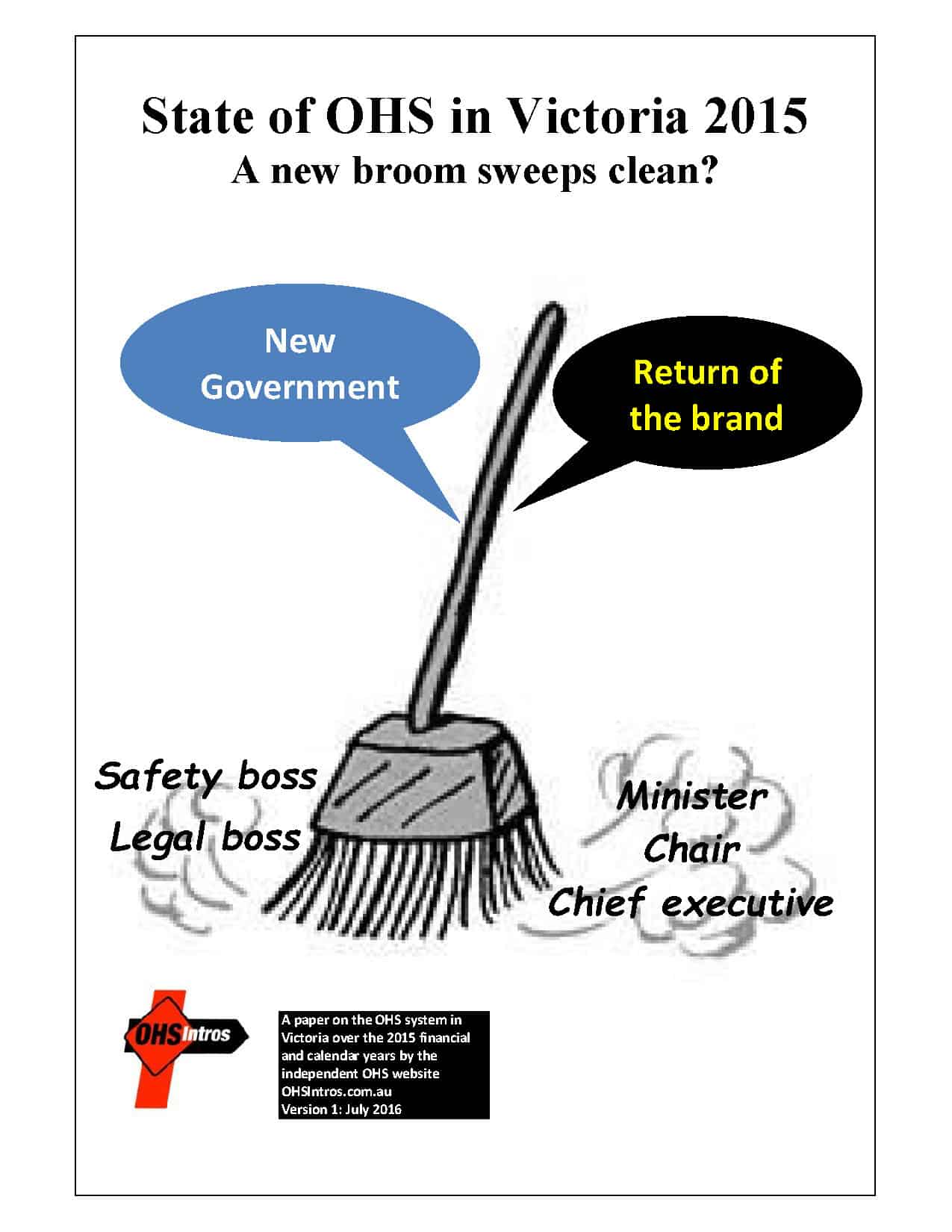Vision of the mistreatment of children in juvenile detention centres in Australia’s Northern Territory was aired on the ABC Four Corners program on 25 June 2016. Within 24 hours, Prime Minister Malcolm Turnbull announced a Royal Commission into juvenile detention. The treatment shown was not new and had been known by the NT Government and Ministers for several years but the quick decision for a Royal Commission shows the political influence of television and current affairs programs. Although not yet written, part of the Royal Commission’s terms of reference should be the investigation of the workplace safety context of juvenile detention centre management and the treatment of the young inmates. Continue reading “Royal Commission into juvenile detention should include OHS”
Category: government
Independent analysis of WorkSafe Victoria
 Barry Naismith‘s third report into the operations and performance of WorkSafe Victoria was released on July 22, 2014. Naismith produces these reports through a combination of publicly available information in the press, a dive into the resources of the WorkSafe Library (visit before it moves to Geelong) and requests to WorkSafe. This level of analysis and interpretation is rarely available outside of formal academic research and Naismith provides the all-important social and political context from which much academic occupational health and safety (OHS) research shies.
Barry Naismith‘s third report into the operations and performance of WorkSafe Victoria was released on July 22, 2014. Naismith produces these reports through a combination of publicly available information in the press, a dive into the resources of the WorkSafe Library (visit before it moves to Geelong) and requests to WorkSafe. This level of analysis and interpretation is rarely available outside of formal academic research and Naismith provides the all-important social and political context from which much academic occupational health and safety (OHS) research shies.
His latest paper focuses on 2015. Continue reading “Independent analysis of WorkSafe Victoria”
Worker democracy reappears and OHS needs to be ready
Tripartite consultation of occupational health and safety (OHS) is largely a relic of the past. It remains in the structure of government policy formulation and in workplace safety legislation but, largely due to the decline in trade union presence in Australian workplaces; OHS consultation occurs more linearly than through formalised tripartism.
A recent example of contemporary consultation, that is likely to include OHS, was reported on in The Guardian newspaper on 17 July 2016. The incoming UK Prime Minister, Theresa May, wants to encourage the inclusion of a worker on company boards. It is a curious suggestion from a Conservative Prime Minister which has been leapt on as “workplace democracy” by some commentators. The workplace democracy or “industrial democracy” push is not a new idea and was once seriously proposed in 1977 but, according to an article in The Conversation, the political time was not right. Whether that time is now is debatable. Continue reading “Worker democracy reappears and OHS needs to be ready”
“We are the safest” – No, only half right
Governments around the world love to be able to claim their State or Country as the safest in the world, when they can. Australia has been plagued by such claims between various States but a report released on July 6 2016 shows that such claims are only half the story.
The Institute for Safety, Compensation and Recovery Research (ISCRR) released its report about “Work-related injury and illness in Australia, 2004 to 2014“. The report makes this extraordinary finding:
“Across Australia, there are twice as many estimated work-related injuries as there are accepted workers compensation claims. This indicates that many injuries do not progress into the nations workers compensation systems” (page 2)
This statement seems to indicate that political statements made on the basis of workers’ compensation data, the major rationale for most of the “we are the safest” statements, are only half right!
When culture has an agenda
The topic of culture is a critical consideration in the improvement of occupational health and safety (OHS). Each company should be aiming for a an active and healthy workplace and safety culture but the term “culture” continues to be difficult to define and poorly understood by the community.
SafetyAtWorkBlog has written about the culture discussion as it relates to
Do workers have a human right to workplace health and safety?
It is common for workers, particularly trade union members, to insist that workers have a right to a safe and healthy workplace and work. Often this is said to be a Human Right. But does occupational health and safety (OHS) involve Human Rights or is the claim simply trade union hyperbole? Continue reading “Do workers have a human right to workplace health and safety?”
NSW Gov’t announces first quad bike safety rebate program
On 10 June 2016, the New South Wales Minister for Innovation and Better Regulation Victor Dominello announced a $A2 million rebate program to improve safety associated with the use of quad bikes on farms. According the media release (curiously released late on the eve of a national long weekend):
“The NSW Government will be offering rebates of up to $500 towards the purchase of compliant helmets, Operator Protective Devices, the purchase of a safer vehicle, such as a side-by-side vehicle, and undertaking training courses tailored to farmers.”
The rebate package seems to tick all the safety boxes and should make a difference. Continue reading “NSW Gov’t announces first quad bike safety rebate program”
